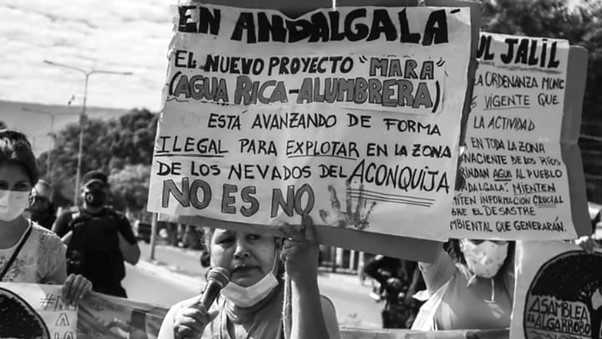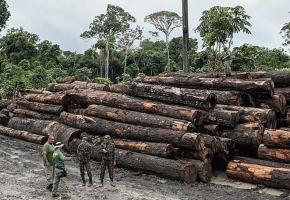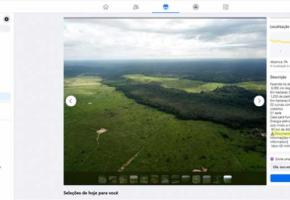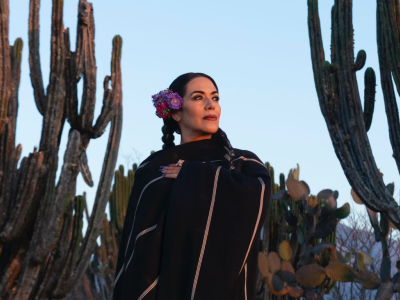"This is a town which has been fighting for its rights for more than eleven years, a population fed up with their rights not being respected," says Mariana Katz, a lawyer for the El Algarrobo Assembly in Andalgalá, in the state of Catamarca, Argentina. ‘They feel that democracy never arrived for them, they see how they are prosecuted and criminalized for defending the water and land.’
Tensions have been running high in Andalgalá in recent weeks over the Minera Agua Rica-Alumbrera (MARA) project near Nevados de Aconquija. MARA is the integration of the Agua Rica copper mine with the infrastructure of Bajo de la Alumbrera, a controversial gold and copper project which finished production in 2018.
While there have been anti-mining protests in Andalgalá every Saturday for 11 years, the latest mobilisations have intensified since 23 December last year, when Catamarca’s Court of Justice declared unconstitutional a ruling from 2016 which prohibited open-pit mining in the Andalgalá river basin. This decision was taken just days after Yamana Gold and Glencore announced the completion of the MARA integration.
The El Algarrobo Assembly – an organisation comprised of local residents opposed to large-scale mining operations in the area – argues that MARA is illegal and violates the Glacier Law, the Forest Law, two precautionary measures (208, 209) and municipal ordinance 029/16.
Criminalisation and Repression
Following a protest against MARA last month by El Algarrobo Assembly, the asembleistas have complained of criminalisation and repression.
‘Today, with an order issued by the Deputy Prosecutor Soledad Rodríguez (who worked as an active lawyer for the mining companies and was part of [mining company] Camyen, the police are violently entering the houses of assembly members, beating them and planting evidence in order to criminalize the defenders of water in Andalgalá’, reported the Assembly on Facebook.
On Saturday 10 April, as the provincial government authorized the excavators to enter the Agua Rica mining site to begin the operation, over 4000 people marched through Andalgalá. Despite the presence of 300 police, a group of masked individuals attacked Agua Rica’s head office and the local headquarters of the Justicialist (Peronist) party.
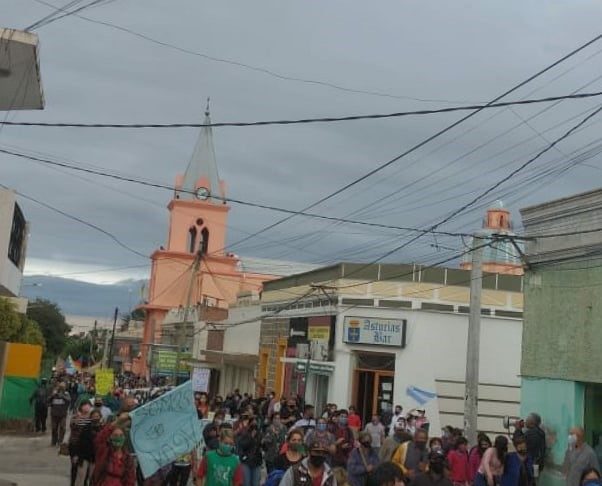
On its Facebook page, the Assembly denied any involvement and blamed the violence on police infiltrators.
‘We deny any connection with the violent incidents that occurred this afternoon … In addition, we publicly denounce the police for leaving the area and sending infiltrators who started the fires and attacks on the building where Agua Rica has its offices. Where were the 60 policemen who came from the state capital, who were on patrol until the afternoon but disappeared at the time of the riots?’
In the aftermath of the protest, the police arrested 12 people, including Aldo Flores (72), a leader of the assembly. Although because of his age he was kept under house arrest rather than in prison, he accused the police of brutality during his detention.
The families of the others arrested made similar accusations. ‘They broke down the front door,’ said Fabio Paz, an assembly member. ‘They threw my mother to the ground, they told her to put her hands on her head. They made my 8-year-old nephew get on his knees.’
Assembly members also report drones flying over their houses and trucks parked outside from which they are filmed and photographed.
Organisations and institutions across Argentina have expressed solidarity with the people of Andalgalá, calling for the release of the activists and an end to the militarisation and criminalization of protest.
An Open Letter
An open letter sent by the Assembly to the provincial and national governments collected more than 2,500 signatures in a single day. Those who put their name to the letter included public figures such as Nora Cortiñas of the Madres de la Plaza de Mayo, and Adolfo Pérez Esquivel, Nobel Peace Prize winner and founder of the Peace and Justice Service (Serpaj).
‘We demand the immediate release of those detained, the withdrawal of the security forces from the area and an end to the harassment of those who defend the environment, health and life,’ reads the letter.
‘We also demand that the mining exploration be stopped, as not only is it illegitimate and contrary to the wishes expressed by the people of Andalgalá for more than 11 years, but it is also illegal.’
On 26 April, those who had been detained were released on bail. However, they are still facing prosecution on charges relating to the protests of 10 April.
Interview from 2010 with Adolfo Pérez Esquivel about the mining problems in Andalgalá. Video: Radio 21/Asamblea Algarrobo
Brazil: The triple threat to the indigenous territories of the Amazon
On 23 March, over 80 indigenous leaders and environmental activists from around the world signed an open letter to BlackRock, the world’s largest asset manager, denouncing the company for ignoring environmental and human rights violations committed by the companies it finances.
Despite its widely proclaimed commitment to sustainability and global climate goals, BlackRock continues to finance the largest contributors to the global climate crisis: large-scale mining, fossil fuel extraction and agribusiness.
‘While BlackRock makes pledges to ask portfolio companies to cut emissions in the future, our forests are being razed, our land is being stolen, and our people are being killed, today,’ says the letter.
‘Communities around the world are facing an epidemic of violence, murder, and criminalization at the hands of extractive industries. In 2019, more than four land and environmental defenders were murdered each week for protecting their traditional lands’.
The letter was a response to BlackRock’s recent memo regarding the stewardship of ‘natural capital’, in which they ask companies in their portfolio to provide a clear climate and risk management strategy.
BlackRock specifically asks them to address the biggest concerns raised by communities, such as deforestation and human rights, and urges them to safeguard the rights of indigenous peoples. However, the memo is vague on how BlackRock will ensure that companies follow these guidelines.
‘BlackRock should adopt a definitive no-deforestation and human rights policy with clear accountability mechanisms that result in concrete improvements for communities, ecosystems, and the planet,’ said Moira Birss, climate and finance director at the NGO Amazon Watch.
Anglo American won’t rule out mining on indigenous lands
One of BlackRock’s key holdings is Anglo American, a British mining company which has been widely criticised for involvement in human rights abuses and environmental destruction in Latin America.
Data collected by the Amazonia Minada project shows that on 30 January Anglo American had 86 applications to mine on indigenous lands in the Brazilian Amazon, 23 of which are located on the Sawré Muybu Indigenous Territory of the Munduruku people. The Munduruku have explicitly and repeatedly rejected mining. ‘Anglo American – Get Out! Demarcation Now! The people will go on resisting,’ wrote Alessandra Munduruku, community leader and recipient of the Robert F. Kennedy Human Rights Award.
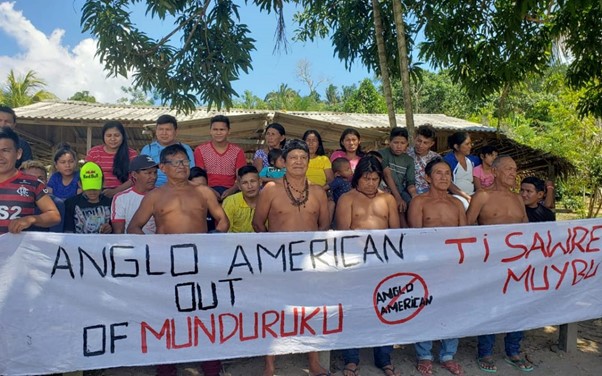
Alongside Amazon Watch, the Association of Indigenous Peoples of Brazil published an official letter to Anglo American, hoping to obtain a public pledge from the company not to mine on indigenous land and to withdraw all applications for research in indigenous territories.
Anglo American refused. In their response, the company stated that they ‘are unable to commit to ruling out ever undertaking any mining activities on Indigenous Lands in Brazil’.
Bolsonaro’s ‘Death Bill’
Although indigenous peoples in Brazil have a constitutional right to the lands that they have historically occupied (Art. 231), the Bolsonaro administration is pushing ahead with a bill (PL 191/2020) designed to deprive them of this legal protection and open up their territories to mining and other extractive industries.
Bolsonaro has overseen the sharpest increase in mining requests on indigenous lands in 24 years. Just the proposal of this new law has resulted in a spike of illegal mining activities in the forest. The Munduruku in particular have been badly impacted by wildcat miners and approval of the bill will only make things worse.
‘We, the majority of the Munduruku people, are against this bill; we want our territory free from mining, prospecting and all other ventures that cause destruction and have an environmental and social impact, from everything that is detrimental to the indigenous way of life,’ the Munduruku wrote in an open letter in late 2020.
‘We own this land, history tells us that we, the Munduruku people, came from this land, and we are not afraid to defend it.’
Meanwhile in Colombia: The coal producer Cerrejón forcibly resettled the Afro-descendent community of Chancleta in 2013, in violation of their rights as a protected ethnic group. Eight years later, Cerrejón continues to refuse to engage with Chancleta’s Community Council – the community’s legal representative – to resolve some outstanding issues related to the resettlement. Residents complain that Cerrejón is attempting to impose its own vision for projects and infrastructure.
Peru: Glencore’s Antapaccay copper mine was forced to shut down temporarily in March following a roadblock by locals from 11 communities in the province of Espinar. The protestors were demanding compensation for environmental impacts associated with the mine and a package from the central government to reactivate the local economy, which has been hit hard by the Covid-19 pandemic.


